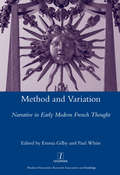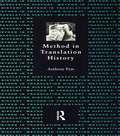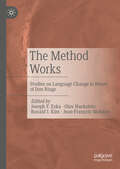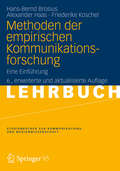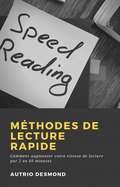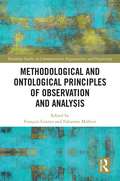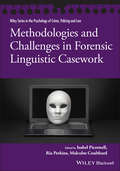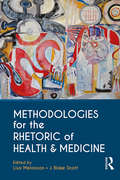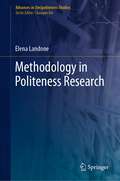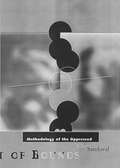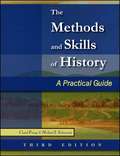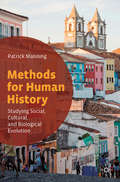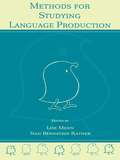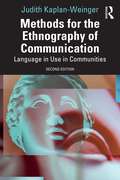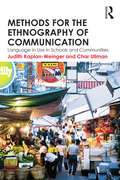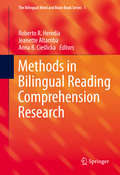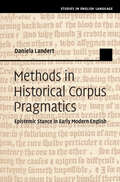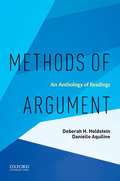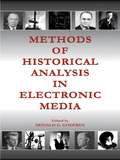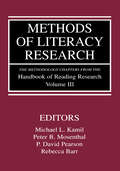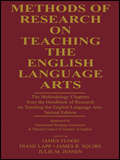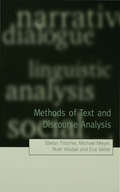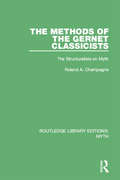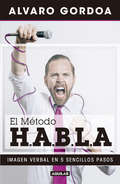- Table View
- List View
Method and Variation: Narrative in Early Modern French Thought
by Emma Gilby"French philosophical and scientific writers of the early modern period made various use of forms of narrative - language that aims to tell a story - in their texts. Equally, authors of fiction often sought to appropriate the language and tools of philosophical and scientific investigation. The contributions in this collection, from some of the most distinguished and exciting scholars working in French Studies today, aim to bring into question oppositional relationships between terms such as 'philosophy' and 'fiction' when these are applied to early modern texts. They consider authors as diverse as Montaigne, Descartes, La Rochefoucauld, Mme de Villedieu and Mme de Lafayette. If we are to be true to the early modern period, they argue, we have to acknowledge it as a time when the figurative, anecdotal and fictive on the one hand, and the truth-seeking on the other, influence each other mutually. Emma Gilby is University Lecturer in French, University of Cambridge. Paul White is Research Associate in French, University of Cambridge."
Method in Translation History
by Anthony PymStarting from the critical notion that we should be asking questions of contemporary importance - and that 'importance' itself must be defined - Anthony Pym sets about undoing many of the currently dominant models of translation history, positing, among much else, that the object of this history should be translators as people, that researchers are subjectively involved in their object, that cultural systems are based on social will, that translators work in intercultural spaces, and that a model of cooperation through negotiation may be applied to the way translators (and researchers!) work between cultures. At the same time, the proposed methodology is eminently constructive, showing how many empirical techniques can be developed and applied: clear illustrations are given of corpus selection, working definitions, deceptive statistics, and the construction of networks and regimes, incorporating elaborate examples drawn from medieval and modernist fields, as well as finding space for notes on practical problems like funding research. Finding its focus in historical debates, this book cannot help but create contemporary debate: its arguments seek not only to revitalize the historical study of translation but also to develop the wider concerns of intercultural studies.
The Method Works: Studies on Language Change in Honor of Don Ringe
by Joseph F. Eska Jean-François Mondon Olav Hackstein Ronald I. KimThis volume contains an introductory essay, the bibliography of Professor Ringe, and nineteen articles on various aspects of historical linguistics composed by current and former colleagues and students at the University of Pennsylvania and a select number of leading scholars in the field based at institutions such as Cornell University, Harvard University, Oxford University, Saarland University, University of Georgia, University of California at Los Angeles, University of Munich, and York University. The majority of contributions focus upon linguistic phylogenetics (the interrelationships among languages), Classical linguistics, and Germanic linguistics. Many of the contributions make contributions to theoretical, as well as historical, linguistics.
Methoden der empirischen Kommunikationsforschung
by Friederike Koschel Alexander Haas Hans-Bernd BrosiusDieses Buch ist eine Einführung in die wesentlichen Methoden der empirischen Kommunikationswissenschaft. Es wendet sich insbesondere an Studierende der Kommunikations- und Medienwissenschaft, die erste Erfahrung mit empirischen Methoden sammeln, und eignet sich als vertiefende Begleitung einführender Vorlesungen und als praxisorientierte Handreichung für Methodenübungen. Leichte Verständlichkeit, Anwendungsorientierung und eine klare Gliederung sind die Haupteigenschaften dieses Lehrbuchs.
Méthodes de Lecture Rapide: Comment augmenter votre vitesse de lecture par 2 en 60 minutes
by Hiddenstuff EntertainmentSouhaiteriez-vous pouvoir relire votre travail et vos courriels deux fois plus vite qu’auparavant ? Pensez au temps que vous pourriez sauver... Découvrez les secrets des professionnels pour lire plus vite que quiconque ! Avec des décennies de stratégies testées, cet ebook vous montrera le moyen le plus rapide et le plus efficace d’augmenter votre vitesse de lecture jusqu’à 2 fois plus vite en quelques heures ! Vous apprendrez comment améliorer votre vitesse en seulement quelques heures. Non seulement cela, mais vous serez capables d’augmenter votre productivité et de libérer du temps que vous auriez autrement dépensé sur les courriels, les devoirs, les révisions, la lecture de livre, la lecture d’articles de presse et pratiquement tout le reste. Vous voulez savoir comment certains ayant une compréhension de lecture lente ont réussi à augmenter leur vitesse de lecture ? Vous aussi vous pouvez apprendre comment y parvenir, vous permettant de devenir plus efficace tout en libérant du temps. Ce guide vous enseigne des techniques éprouvées sans utiliser de suppléments ou de cours coûteux. Est inclus : — Augmentez votre vitesse de lecture par 2 ! — Techniques pour rendre la lecture plus facile et rapide — Parcourez les paragraphes en un coup d’œil ! — Étapes simples et faciles. — Apprenez à lire plus vite en 1 h ou moins ! + ET BIEN PLUS ENCORE ! Si vous souhaitez augmenter votre vitesse de lecture de la meilleure façon possible, alors ce livre est pour vous. -- > Faites défiler vers le haut de la page et cliquez sur Ajouter au panier pour acheter instantanément
Methodological and Ontological Principles of Observation and Analysis: Following and Analyzing Things and Beings in Our Everyday World (Routledge Studies in Communication, Organization, and Organizing)
by François Cooren Fabienne MalboisIn our daily experiences, we feel, perceive, designate, invoke or comment on a plurality of beings: people, artifacts, technologies, institutions, projects, animals, divinities, emotions, cultures, ideologies or opinions that are part of our world. While these beings are all part of our world, they present various forms of existence. Echoing recent developments in existential anthropology, Communication as Constitutive of Organization (CCO) research, and Actor Network Theory, here scholars from a variety of disciplines discuss how they study the types of beings that have been at the core of their respective research. Reflecting on the specific mode of existence, presence and action of the being they follow, they reveal the methodological innovations they deploy in order to analyze excerpts of field notes, filmed interactions, conversations, pictures, newspapers, narratives, etc.
Methodologies and Challenges in Forensic Linguistic Casework (Wiley Series in Psychology of Crime, Policing and Law)
by Malcolm Coulthard Isabel Picornell Ria PerkinsMethodologies and Challenges in Forensic Linguistic Casework Discover more about Forensic Linguistics, a fascinating cross-disciplinary field from an international team of renowned contributors Methodologies and Challenges in Forensic Linguistic Casework provides an overview of the range of forensic linguistic casework typically found in investigative and judicial contexts. In these case studies, the authors demonstrate how linguistic theory is applied in real-life forensic situations and the constraints and challenges they have to deal with. Drawing on linguistic expertise from the USA and Europe involving casework in English, Spanish, Danish and Portuguese, our contributing practitioners exemplify the most common types of text analysis such as identifying faked texts, suspect profiling, analyzing texts whose authorship is questioned, and giving expert opinions on meaning and understanding. Methodologies and Challenges in Forensic Linguistic Casework is designed for investigators and legal practitioners interested in the use of language analysis for investigative or evidentiary purposes, as well as for students and researchers wanting to understand how linguistic theory and analysis may be applied to solving real-life forensic problems using current best practice.
Methodologies for the Rhetoric of Health & Medicine
by J. Blake Scott Lisa MelonconThis volume charts new methodological territories for rhetorical studies and the emerging field of the rhetoric of health and medicine. In offering an expanded, behind-the-scenes view of rhetorical methodologies, it advances the larger goal of differentiating the rhetoric of health and medicine as a distinct but pragmatically diverse area of study, while providing rhetoricians and allied scholars new ways to approach and explain their research. Collectively, the volume’s 16 chapters: Develop, through extended examples of research, creative theories and methodologies for studying and engaging medicine’s high-stakes practices. Provide thick descriptions of and heuristics for methodological invention and adaptation that meet the needs of needs of new and established researchers. Discuss approaches to researching health and medical rhetorics across a range of contexts (e.g., historical, transnational, socio-cultural, institutional) and about a range of ethical issues (e.g., agency, social justice, responsiveness).
Methodology in Politeness Research (Advances in (Im)politeness Studies)
by Elena LandoneThis book presents overviews on the specific methods for the study of verbal politeness, which is deeply and constantly involved in our social life. The text offers an original and specific synthesis of traditional and innovative methods for the study of politeness as we conceive it today: as a complex system between the individual microcosm (psychological and cognitive) and the social macrocosm (cultural and relational). The author addresses theoretical and academic issues while exploring various critical points for the future of politeness studies. The reader is provided with a coherent network, which crosses between theory, methods and tools for research. The network results in a wide range of model research that facilitates the practical understanding of the potential for each data collection technique. This monograph offers representative examples of studies of various languages and cultures and appeals to students, researchers and professionals within the field.
Methodology of the Oppressed (Theory Out of Bounds #18)
by Chela SandovalA new approach to feminist thought that challenges current critical theories.In a work with far-reaching implications, Chela Sandoval does no less than revise the genealogy of theory over the past thirty years, inserting what she terms "U.S. Third World feminism" into the narrative in a way that thoroughly alters our perspective on contemporary culture and subjectivity.What Sandoval has identified is a language, a rhetoric of resistance to postmodern cultural conditions. U.S. liberation movements of the post-World War II era generated specific modes of oppositional consciousness. Out of these emerged a new activity of consciousness and language Sandoval calls the "methodology of the oppressed." This methodology—born of the strains of the cultural and identity struggles that currently mark global exchange—holds out the possibility of a new historical moment, a new citizen-subject, and a new form of alliance consciousness and politics.Utilizing semiotics and U.S. Third World feminist criticism, Sandoval demonstrates how this methodology mobilizes love as a category of critical analysis. Rendering this approach in all its specifics, Methodology of the Oppressed gives rise to an alternative mode of criticism opening new perspectives on any theoretical, literary, aesthetic, social movement, or psychic expression.
The Methods and Skills of History: A Practical Guide (Third Edition)
by Conal Furay Michael J. SalevourisThe Methods and Skills of History: A Practical Guide, is a dynamic text/workbook that combines theory with "hands on" practice, providing engaging essays, documents, and exercises designed to make history more meaningful and accessible to student readers--whether they are majoring in history, taking a history course as an elective, or simply reading history on their own--as well as strengthen their critical-thinking and communication skills.
Methods for Human History: Studying Social, Cultural, and Biological Evolution
by Patrick ManningThis book presents a concise yet comprehensive survey of methods used in the expanding studies of human evolution, paying particular attention to new work on social evolution. The first part of the book presents principal methods for the study of biological, cultural, and social evolution, plus migration, group behavior, institutions, politics, and environment. The second part provides a chronological and analytical account of the development of these methods from 1850 to the present, showing how multidisciplinary rose to link physical, biological, ecological, and social sciences. The work is especially relevant for readers in history and social sciences but will be of interest to readers in biological and ecological fields who are interested in exploring a wide range of evolutionary studies.
Methods for Studying Language Production
by Lise Menn Nan Bernstein RatnerIn this volume, which simultaneously honors the career contributions of Jean Berko Gleason and provides an overview of a broad and increasingly important research area, a panel of highly productive language researchers share and evaluate methods of eliciting and analyzing language production across the life span and in varying populations. Chapters address a wide variety of historical and evolving approaches to data collection for the study of morphosyntax, the lexicon, and pragmatics, both laboratory-based and naturalistic. Special concerns that arise in the study of atypical child development, aging, and second language acquisition are a focus of the discussion.
Methods for the Ethnography of Communication: Language in Use in Communities
by Judith Kaplan-WeingerMethods for the Ethnography of Communication is a guide to conducting ethnographic research in classroom and community settings that introduces students to the field of ethnography of communication and takes them through the recursive and nonlinear cycle of ethnographic research.This brand-new edition includes the most up-to-date research, with the authors introducing the innovative CULTURES framework to provide a helpful structure for moving through the complex process of collecting and analyzing ethnographic data and address the larger 'how-to' questions that students struggle with during ethnographic research. Exercises and activities help students make the connection between communicative events, acts, and situations and ways of studying them ethnographically.Integrating a primary focus on language in use within an ethnographic framework makes this book an invaluable core text for courses on ethnography of communication and related areas in a variety of disciplines.
Methods for the Ethnography of Communication: Language in Use in Schools and Communities
by Judith Kaplan-Weinger Char UllmanMethods for the Ethnography of Communication is a guide to conducting ethnographic research in classroom and community settings that introduces students to the field of ethnography of communication, and takes them through the recursive and nonlinear cycle of ethnographic research. Drawing on the mnemonic that Hymes used to develop the Ethnography of SPEAKING, the authors introduce the innovative CULTURES framework to provide a helpful structure for moving through the complex process of collecting and analyzing ethnographic data and addresses the larger "how-to" questions that students struggle with when undertaking ethnographic research. Exercises and activities help students make the connection between communicative events, acts, and situations and ways of studying them ethnographically. Integrating a primary focus on language in use within an ethnographic framework makes this book an invaluable core text for courses on ethnography of communication and related areas in a variety of disciplines.
Methods in Bilingual Reading Comprehension Research
by Roberto R. Heredia Jeanette Altarriba Anna B. CieślickaThe collected essays in this volume present an overview and state-of-the-field of traditional and recently developed methodological approaches to the study of bilingual reading comprehension. It critically reviews and examines major findings from classical behavioral approaches such as the visual moving window, rapid-serial visual presentation (RSVP), and eye-tracking, as well as newly developing neuropsycholinguistic methodologies such as Event-Related Potentials (ERPS), and Functional Magnetic Resonance Imaging (fMRI). Written to address a timely topic, Methods in Bilingual Reading Comprehension Research updates the field of bilingual reading by critically examining the contributions of the various behavioral and technologically-based reading techniques used to understand psychological processes underlying written language comprehension. Each topic is covered first from a theoretical, and then from an experimental, viewpoint. Moreover, the volume contributes to the development and establishment of Bilingual Reading as a subfield of bilingual sentence processing and fills a significant gap in the literature on bilingual language processing and thought. Significantly, Methods in Bilingual Reading Comprehension Research presents an overall view of some of the typical psycholinguistic techniques and approaches, as well as proposing other possible tasks that may prove viable in investigating such theoretical issues as bilingual lexical ambiguity resolution, or how bilingual speakers might resolve multiple sources of potentially conflicting information as they comprehend sentences and discourse during the communicative process. In addition, to aid reader comprehension and encourage readers to acquire "hands on" experience in the creation and development of experiments in the realm of bilingual reading research, each chapter includes a list of key words, suggested student research projects, and questions to both help the reader review the chapter and expand upon the reading. With its comprehensive coverage of a crucial subfield of psycholinguistics and language processing, Methods in Bilingual Reading Comprehension Research is an invaluable and informative resource for all students and researchers in bilingualism, neurolinguistics, bilingual cognition, and other related fields.
Methods in Historical Corpus Pragmatics: Epistemic Stance in Early Modern English (Studies in English Language)
by Daniela LandertBased on an extensive corpus-based study, this revealing book explores how epistemic stance is expressed in the early modern period, and in doing so, presents new methodologies for using corpora to investigate issues in historical pragmatics. It provides a new, corpus-driven method for the analysis of pragmatic functions that rely on context-dependent interpretations. By retrieving passages that include a high-density of the pragmatic function under investigation, the subsequent analysis can reveal previously neglected forms and context-dependent factors. It includes four empirical studies that apply the method to the analysis of epistemic stance in four Early Modern English corpora, the result of which emphasise the importance of context for the expression of stance. It also includes an appendix with inventories of Early Modern English stance expressions, offering starting points for further research studies. It is essential reading for researchers and students in historical pragmatics and corpus pragmatics.
Methods Of Argument: An Anthology Of Readings
by Deborah Holdstein Danielle Aquiline"This reader is designed to support Composition II courses focused on methods and techniques of argument. The selections will model an array of critical thinking as well as argumentative writing techniques by which one can argue a single point of view and also more complex, mixed forms of argumentation. The goal will always be to model how a student may respond, in writing and discussion, with an accountable, well-supported viewpoint. In a current climate of 'fake news' and 'alternative facts,' this reader provides a timely and compelling context in which to offer students opportunities to craft reasoned arguments with evidence. Selections will be framed by an introduction featuring a narrative on analyzing and writing arguments, the importance of accountability (including challenging others' less-than-compelling arguments), and information on the reading and writing process. Selections themselves will comprise both classic and contemporary sources and be diverse in origin, genre, and topic"--
Methods of Historical Analysis in Electronic Media (Routledge Communication Series)
by Donald G. GodfreyMethods of Historical Analysis in Electronic Media provides a foundation for historical research in electronic media by addressing the literature and the methods--traditional and the eclectic methods of scholarship as applied to electronic media. It is about history--broadcast electronic media history and history that has been broadcast, and also about the historiography, research written, and the research yet to be written.Divided into five parts, this book:*addresses the challenges in the application of the historical methods to broadcast history;*reviews the various methods appropriate for electronic-media research based on the nature of the object under study;*suggests new approaches to popular historical topics;*takes a broad topical look at history in broadcasting; and*provides a broad overview of what has been accomplished, a historian's challenges, and future research.Intended for students and researchers in broadcast history, Methods of Historical Analysis in Electronic Media provides an understanding of the qualitative methodological tools necessary for the study of electronic media history, and illustrates how to find primary sources for electronic media research.
Methods of Literacy Research: The Methodology Chapters From the Handbook of Reading Research, Volume III
by P. David Pearson Michael L. Kamil Peter B. Mosenthal Rebecca BarrIn this volume, 10 reviews of significant reading research methodologies are reprinted from the Handbook of Reading Research, Volume III. The editors have judged that these specific methodologies have had great impact on reading research since the publication of Volume II in 1991. This text is especially well-suited for use in upper-level undergraduate and graduate-level reading research methods courses.
Methods of Murder
by Elena M. PastThe first extended analysis of the relationship between Italian criminology and crime fiction in English, Methods of Murder examines works by major authors both popular, such as Gianrico Carofiglio, and canonical, such as Carlo Emilio Gadda.Many scholars have argued that detective fiction did not exist in Italy until 1929, and that the genre, which was considered largely Anglo-Saxon, was irrelevant on the Italian peninsula. By contrast, Past traces the roots of the twentieth-century literature and cinema of crime to two much earlier, diverging interpretations of the criminal: the bodiless figure of Cesare Beccaria's Enlightenment-era On Crimes and Punishments, and the biological offender of Cesare Lombroso's positivist Criminal Man.Through her examinations of these texts, Past demonstrates the links between literary, philosophical, and scientific constructions of the criminal, and provides the basis for an important reconceptualization of Italian crime fiction.
Methods of Research on Teaching the English Language Arts: The Methodology Chapters From the Handbook of Research on Teaching the English Language Arts, Sponsored by International Reading Association & National Council of Teachers of English
by James Flood Diane Lapp James R. Squire Julie M. JensenThis text makes available in a concise format the chapters comprising the research methodology section of the Handbook of Research on Teaching the English Language Arts, Second Edition. An introduction, designed to give K-12 teachers an understanding of the basic categories and functions of research in teaching, is followed by chapters addressing teacher professionalism and the rise of "multiple literacies"; empirical research; longitudinal studies; case studies; ethnography; teacher research; teacher inquiry into literacy, social justice, and power; synthesis research; fictive representation; and contemporary methodological issues and future direction in research on the teaching of English. Methods of Research on Teaching the English Language Arts is well-suited for use in upper-level undergraduate and graduate-level literacy research methods courses.
Methods of Text and Discourse Analysis: In Search of Meaning
by Michael Meyer Ruth Wodak Eva Vetter Stefan Titscher'This volume is the most comprehensive overview to date of sociologically orientated approaches to text and discourse analysis and is worth reading even for those who are interested only in purely linguistiv approaches to text and discourse. Its main merit, I think, is that it intorduces approaches which up to now have hardley been admitted into the universe of scientific discourse' - Discourse Studies Methods of Text and Discourse Analysis provides the most comprehensive overview currently available of linguistic and sociological approaches to text and discourse analysis. Among the 10 linguistic and sociological models surveyed in this book some of the more important are Grounded Theory, Content Analysis, Conversation Analysis and Critical Discourse Analysis. The book presents each approach according to a standardised format, which allows for direct systematic comparisons. The fully annotated lists of sources provide readers with an additional means of evaluation of the competing analytical methods. Interdisciplinary and international in its aims, Methods of Text and Discourse Analysis suggests the benefits both linguists and sociologists will derive from a more intimate knowledge of each others' methods and procedures.
The Methods of the Gernet Classicists: The Structuralists on Myth (Routledge Library Editions: Myth #2)
by Roland A. ChampagneThe Gernet Centre was founded as a place where the structural method could be applied to the classics. ‘Structuralists’ attribute the survival, origin and function of myths to common crosscultural factors they identify as ‘structures’. As this book, first published as The Structuralists on Myth in 1992 explains, these structures are bundles of information not obvious either to the narrator or to the listener. The bundles are collected features that reveal either the reasons for the survival of myths, or their origins, or their functions within their contexts. The structuralists consider themselves to have talents as the collectors from myths of these bundles of information.
El método H.A.B.L.A: Imagen verbal en 5 sencillos pasos
by Álvaro GordoaAprende a comunicarte con los demás de manera asertiva y alcanza el éxito en tu vida. El Método H.A.B.L.A. te permitirá capacitarte directamente con el principal maestro y especialista en el tema de la Imagen Verbal ®. Hablar lo hace cualquiera. Penetrar en la mente del otro, necesita de un método. En este libro encontrarás un sencillo y divertido camino a seguir, con todas las claves para hablar en público y gozar de los beneficios de la comunicación de alto impacto. Con recomendaciones que podrás implementar de inmediato y sorprendentes revelaciones que desmitifican la dificultad de hablar en público. Figuras públicas opinan sobre este libro: "El saber hablar en público es de las habilidades que más admiro y Alvaro ha hecho de esto algo sencillo y divertido. De primera mano les garantizo que este método les cambiará la vida. A partir de hoy simplemente ¡H.A.B.L.A.!" -Martha Debayle, empresaria y comunicadora, reconocida como una de las mujeres más influyentes de Latinoamérica- "Hablar en público no es sólo para los políticos, hoy todos tenemos la necesidad de hacerlo bien y con claridad. Alvaro Gordoa, con El Método H.A.B.L.A., nos enseña cómo." -Fernando Lerdo de Tejada, ex vocero de la Presidencia de la República y experto en cabildeo y comunicación- "De El Método H.A.B.L.A. aprendí muchas cosas que uso diariamente en mi vida profesional. Alvaro te enseña a disfrutarlo tanto, que hablar en público pasa de ser una preocupación a una adicción." -Yordi Rosado, conductor, productor, conferencista y autor bestseller- "Con El Método H.A.B.L.A. los lectores entenderán muy fácilmente los principios de la oratoria y podrán enfrentar a un público y expresar sus ideas con claridad. Es un método que recomiendo ampliamente." -Antonio Asali, V.P. de Comunicación Verbal de la Asociación Mexicana de Consultores Políticos-
